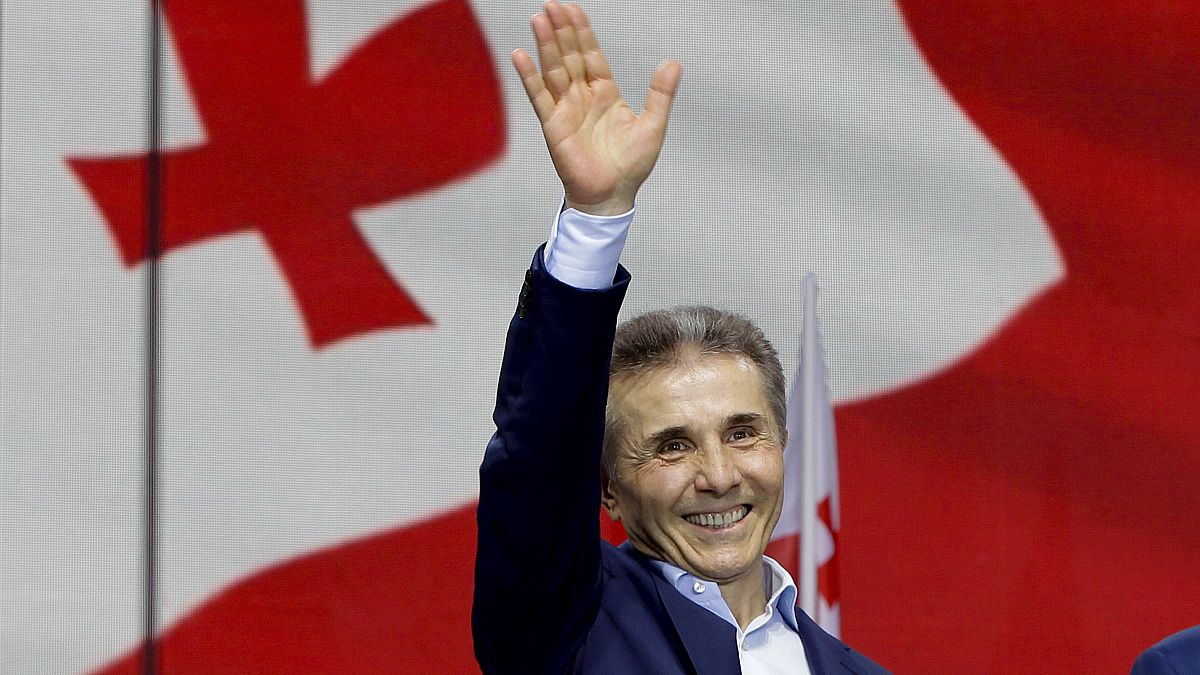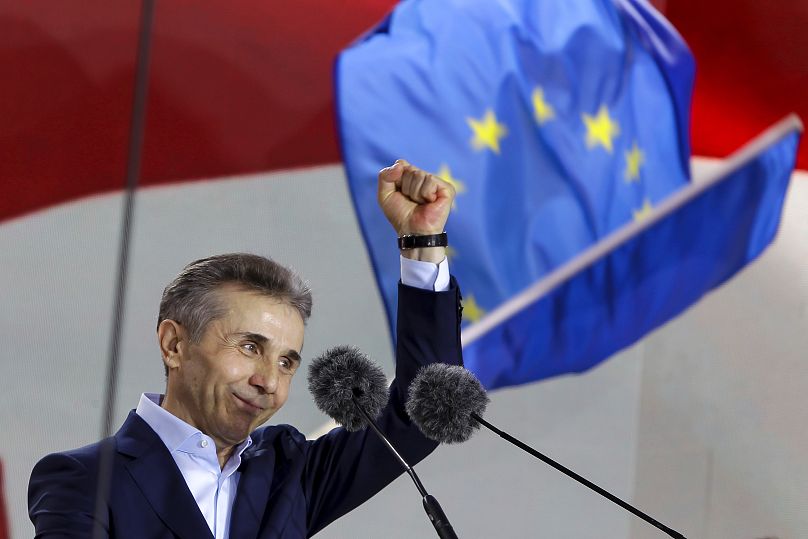Georgia's Parliamentary Election Results: Why Did They Alarm the EU?

“It is unlikely that this matter will be resolved anytime soon.”
Georgia, a former Soviet republic located in the Caucasus, remains a pivotal battleground for influence between Russia and the West. At the forefront of this geopolitical contest is the European Union, which is actively pursuing the integration of Georgia into its bloc.
The parliamentary elections held in Georgia on October 26, 2024, highlighted this ongoing rivalry, as the ruling party, Georgian Dream, won by a landslide.
These legislative elections have been contested in Georgia, with the opposition condemning alleged “fraud” following the “Russian model.”

Georgian Dream
Georgia's electoral authorities officially awarded the Kremlin-aligned Georgian Dream party 54.8% of the votes, while the combined opposition received around 37%.
This victory sets the stage for a fourth term for Georgian Dream, which secured 89 seats in Parliament—one seat fewer than in 2020—while four pro-Western opposition parties collectively obtained 61 seats.
Almost all opposition parties, along with the pro-Western Georgian President Salome Zourabichvili, who has long distanced herself from Georgian Dream, declared they would not accept the results and called for protests.
Georgian Dream has been in power since 2012 and is criticized by opponents for allegedly establishing a pro-Russian authoritarian regime in Georgia, while facing competition from four main opposition coalitions representing pro-Western interests.
These results deal a significant blow to pro-Western Georgians, who see the election as a choice between the ruling party, which is strengthening ties with Russia, and the opposition, which hoped to accelerate integration with the European Union.
President Salome Zourabichvili condemned the elections, specifically denouncing what she described as a “sophisticated” voting fraud.
Asked why she is refusing to recognize the results of the election, Zourabichvili said Georgian Dream had used “all the instruments” at its disposal to rig the election and called for an international investigation.
Pro-European opposition leaders, the president breaking from the government’s stance, and several European nations all cited “irregularities” in the election process.
They described these parliamentary elections as an existential battle that would determine whether the country would deepen its ties with the West or revert to a pro-Russian stance.
Georgia is a sovereign state in the South Caucasus region of Western Asia, bordered by the Black Sea to the west, Russia to the north, Turkiye and Armenia to the south, and Azerbaijan to the east, with a population of 3,694,600.
In mid-December 2023, the European Union granted Georgia candidate status for membership, along with recommendations to continue political reforms to achieve this goal.
President Zourabichvili urged European nations to support her country on its “European path” during a ceremony attended by ambassadors from those countries on May 4, 2024.
Georgia is fulfilling commitments under its partnership agreement with the EU to join the bloc by 2030.
Opponents of the Georgian Dream said the party aims to shift Georgia closer to Moscow, undermining its aspirations for EU and NATO membership.
As such, opposition parties, in a statement on October 30, 2024, ridiculed the “absurd” investigation conducted by the Prosecutor General's Office “under Russian control” regarding a “special Russian operation.”
Zourabichvili accused Moscow of orchestrating electoral fraud, resorting to Russian-style tactics and propaganda.
In an interview with Agence France-Presse (AFP), Zurabishvili said the extensive planning behind the election fraud likely exceeded the government’s own capacity to cling to power, pointing instead to a “Russian methodology.” She found this unsurprising, “given the nature of relations between the ruling party and Russia.”
“Georgian Dream's electoral propaganda was totally copied from Russian propaganda.”
The vote, as she claimed, saw “the purchase of votes, pressure in particular on public office holders, pressure on the families of prisoners who can be promised release.”
“There was money distributed visibly in minibusses at the exit of the polling stations.”
The vote also saw “methods linked to electronic voting technology,” marking their first use in the election.
Identity cards with the same number were used to vote multiple times in different regions, the president added.
The Kremlin, in turn, firmly rejected these allegations of interference, accusing Zurabishvili of “attempts to destabilize” her country.
Meanwhile, the United States and the European Union condemned “electoral abuses,” urging Tbilisi to launch investigations.
Ukrainian President Volodymyr Zelensky, who is defending his country against Russia’s war, expressed regret over the election outcome on October 30, claiming that Russia was the real winner and that the election had “stolen the freedom” of the Georgian people.

A Message to Europeans
Commenting on the situation, Russian affairs analyst Oleg Ignatov said the Georgian Dream party’s victory shows that, while support for EU and NATO integration remains strong, a substantial portion of Georgian society still favors stable and predictable relations with Moscow.
“This represents an important signal for Kremlin policy in the post-Soviet space, which could become a model conflict in the region for the coming years,” Ignatov told Newsweek.
Georgia remains under the shadow of a swift war it fought with the Russian army in the summer of 2008, when Russian forces invaded Georgian territory under the pretext of protecting Russian allies from separatists in North Ossetia. However, observers believe the true aim was to prevent Tbilisi from joining the EU and NATO.
Following that war, Russia established permanent military bases in the Moscow-backed separatist regions of Abkhazia and South Ossetia, recognizing them as independent states.
In May 2024, Georgia witnessed protests against a foreign influence bill inspired by Russia's “foreign agents” law, which Moscow has used to suppress civil society. However, this mobilization was insufficient to prevent the legislation from passing.
Following the law's approval, Brussels suspended Georgia's EU accession process, and the United States imposed sanctions on dozens of Georgian officials for their alleged "violent repression" of protesters.
Leaders of the Georgian Dream party, led by oligarch Bidzina Ivanishvili, have sharply criticized the West, with Ivanishvili describing it as a “global war party” aiming to turn Georgia into a pawn in its conflicts.
During the election campaign, the ruling party positioned itself as the only body capable of preventing Georgia from becoming a “new Ukraine” amidst the ongoing conflict between Russia and Western nations.
The ruling party claims it seeks Georgia's EU membership; however, Brussels has stated that the country's membership application is currently on hold due to what it describes as the party's inclination toward dictatorship.
In contrast, Russia welcomed the Georgian Dream's victory in the legislative elections, with some Russian media describing the results as a win for “Putin's allies.”
Following Russia's invasion of Ukraine in February 2022, the Georgian Dream party did not participate in economic sanctions against Russia and resisted Western attempts to draw Georgia into a conflict with Russia.
On October 21, 2024, the founder of the Georgian Dream party, Ivanishvili, acknowledged that an unnamed senior “Western” official suggested to former Prime Minister Irakli Garibashvili that he initiate a war with Russia, according to comments he made on Imedi, the Georgian channel.

‘Competition Arena’
Regarding the significance of Georgia for Russia, Russian political analyst Aleksander Nazarov said the Russian Black Sea Fleet has been relocated from Sevastopol in Crimea to Novorossiysk on the Georgian border to make it more difficult for Ukrainian drone attacks launched by British naval drones. Now, this Russian naval base will be targeted from Georgian territory.
In a Telegram post on October 22, 2024, Nazarov stated, “Georgia is now doing everything it can to avoid aligning itself with the American camp.”
Margarita Simonyan, editor-in-chief of the Russian state-controlled broadcaster RT, wrote, “Georgians have won. Good job!”
However, amid reports of voting irregularities and the opposition parties' outright rejection of the results, it is unlikely that this matter will be resolved anytime soon.
In this context, journalist Natalia Antelava highlighted in an article for The Guardian on October 28, 2024, that “the biggest winner [in Georgia] is the Kremlin, which has just won a battle in its global war against liberal democracy.”
“The Georgian opposition is unlikely to succeed unless it gets focused attention from Europe and the United States.”
“But with the tragedy that has enveloped the Middle East, the drama of the U.S. elections, and the urgency of the increasingly unsustainable war in Ukraine, events in Georgia will struggle to compete for attention,” she added.
“This is a welcome result for Moscow,” Olga Oliker, director, the Europe and Central Asia program of the International Crisis Group, told Newsweek in emailed comments. “
“Russia sees the country as a prize in a contest with the EU, which had offered Tbilisi candidacy. This last now seems unlikely to move forward anytime soon,” she said.
Sources
- Putin Allies Celebrate as Georgia's Ruling Party Claims Victory
- In Georgia, Russia has just scored another victory against liberal democracy
- Georgia’s president calls for rally to save ‘European future’ as thousands protest disputed election
- Georgian president accuses ruling party of using Russian 'methodology' in disputed vote
- Georgian President Slams 'Sophisticated' Voting Fraud In AFP Interview
- Georgia: The Near Future Model for Arab Countries [Arabic]
- Georgian President Won't Recognize Vote Results, Calls For Protests, Alleges Russian Interference










